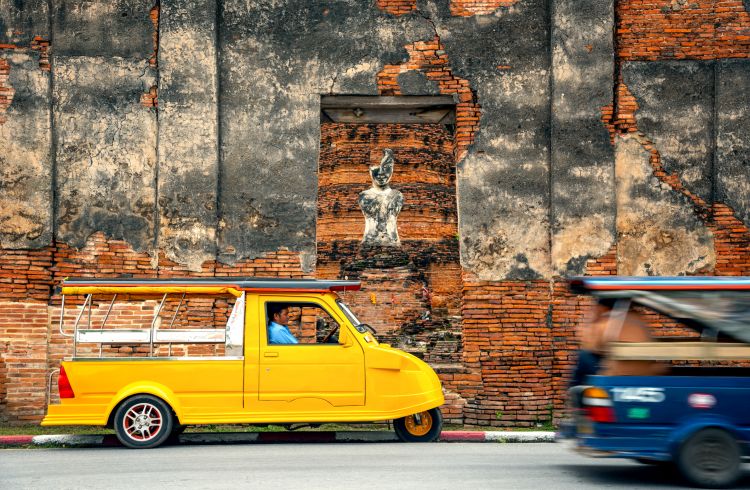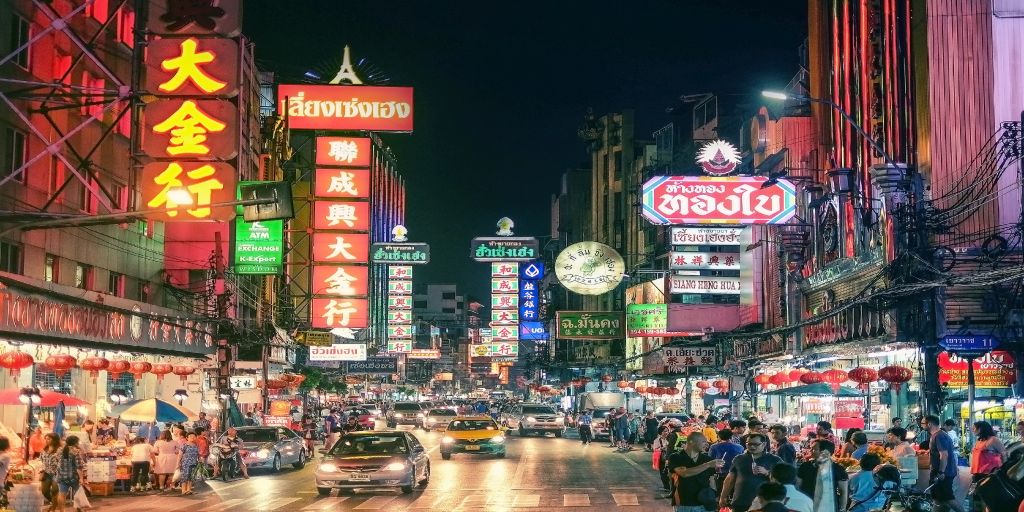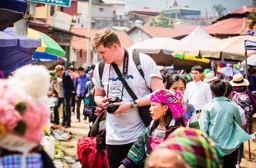10 Common Travel Scams and How You Can Avoid Them
You will meet friendly locals while on the road, however not everyone is as genuine as they seem. Stay alert and safe with these tips to avoid the 10 most common travel scams.
 Photo © GettyImages/Abraham
Photo © GettyImages/Abraham
- The Sauce Trick
- Money Changing
- Dodgy Tours
- Taxi and Tuk Tuk Scams
- Ticket Scams
- Fake Cops
- Rental Scam
- Bar Scam
- Border Scam
- Fake Souvenirs
1. The sauce trick
Essentially, the method is to divert your attention away from your valuables and onto something else. The crook squirts or spills sauce on you. They then point it out, offering to help clean it off you. Meanwhile, they fleece you of your wallet or their accomplice does.
Other ways pickpockets will trick you include being jostled by local kids, someone faking falling over, being wooed by a local or having a cat/baby thrown at you. The trick here is to treat anything unusually diverting as a pickpocket attempt.
2. Money changing
The good old note switch-a-roo happens everywhere. The shopkeeper or taxi driver gives you less change than you are supposed to get. Or they will quickly switch a 50 for a 5 and then claim you haven't given them enough. You approach the foreign exchange booth and ask to change money. During the changeover, the clerk switches similar notes and you end up with less than you paid for.
Make sure you check your money before you leave and don't let them rush you during the process. It's vital that you keep your eyes peeled, as many currencies have denominations that appear similar in color and design.
Tip: Never accept torn, worn or damaged notes. They can be difficult to get rid of later.
3. Dodgy tours
Always travel with a well-established tour company so you know that you'll get what you pay for and your safety will be of primary concern. Do your research, check reviews, and ask your accommodation for recommendations. Always book through reputable websites and operators. Traveling with a dodgy operator could see you stranded, injured, sick, or at the very least, fleeced of some of your holiday funds.
4. Taxi and tuk tuk scams
Drivers overcharging travelers with extortionate fares, claims the meter is broken, unlicensed drivers touting for fares at the airport, taking you on the least direct route... these are just some of the ways you can be scammed by drivers as you try to get around.
Sometimes the taxi driver may also be in cahoots with restaurant owners, shop keepers or attractions and will tell you that whatever place is closed when you ask to go there, instead taking you to an alternative place where the driver receives a kickback for bringing business. Be firm but polite about where you want to go, and if they don't want to take you, get out and find someone else who will.
Always call for a licensed taxi or hail one from an official rank. If you are traveling by tuk-tuk, ask your accommodation if they have a preferred driver. Your accommodation, tour guide or fellow travelers will know how much a fare should cost, and use Google Maps if you suspect that the driver is taking a less direct route.
As tempting as the cheap fare or deal may be, avoid getting into unlicensed taxis. In some parts of the world, such as Latin America, it can be the starting point for an express kidnapping.
5. Ticket scams
You arrive at the bus terminal and someone approaches you with tickets to sell, claiming they are at a discounted rate or that you can jump the ticket queue. You purchase a ticket only to find out when you board the bus that it's fake and invalid. The seller? Nowhere to be seen and your money is gone.
Some of these sellers even go to the length of dressing officially. Always buy your tickets from an official ticket booth or window.
6. Fake cops
Fake cops appear to be everywhere around the world and travelers will often be scammed by these faux authorities to make a quick buck. Most of the time their modus operandi is to ask you for your personal ID and then issue you a fine for no good reason, indicating that it can be paid on the spot or asking for a bribe to get your ID back. Because you don't want to get into trouble you naturally pay up. Sometimes they are uniformed, other times they are plain clothed.
Real police may ask you for your personal ID but they will never ask you to pay the fine on the spot. If you are approached by someone looking official, show them your ID but never give it to them. Ask for their ID too. If they issue you with a fine, tell them you will go to the police station to deal with the matter. The fake ones will usually hightail out of there.
7. Rental scam
Whether it's a jet ski in Thailand or renting a scooter in Mykonos, the old scam of "you damaged it, you pay" is universal. Traveler hires the vehicle and upon return is met with demands for payment for existing damage on it. Your passport may be held and the police may be called. Before hiring any vehicle or equipment, inspect it and take photos of the existing damage, showing the hire operator.
8. Bar scam
You arrive in a new country, and decide to head out and experience the nightlife by grabbing a drink at the local bar. A friendly local comes up to you and strikes up a conversation. As the night wears on and the drinks flow, eventually the local disappears, leaving you with an unpleasant surprise - a huge, overpriced bar bill or your wallet has been pickpocketed. Always keep an eye on your valuables and drinks. Keep track of how much you are drinking. Only pay for what you consume, and don't open up a bar tab.
9. Border scam
This scam often happens in tandem with fake police or officials. You arrive at a border crossing only to be approached by a "visa official" offering to process your entry visa only that they will rip you off on the fee. Sometimes they will also offer you free transport into the city to sweeten the deal. Always go to the official border office to get your visa and know what the visa fee is before you pay.
10. Fake souvenirs
Is that Indigenous carving or painting authentic? Has it been locally crafted? Are the materials sustainably sourced? Unfortunately, no matter where you travel in the world, you will often come across handicrafts and goods which aren't made by local artisans, instead labeled as the real thing and mass-produced in a factory elsewhere. These mass-produced items are created by workers who are often poorly paid and have poor working conditions. Learn more on how to shop for souvenirs sustainably and ethically here.
Have you been scammed while traveling? Let us know about your experience in the comments section below.
Related articles
Simple and flexible travel insurance
You can buy at home or while traveling, and claim online from anywhere in the world. With 150+ adventure activities covered and 24/7 emergency assistance.
Get a quote


No Comments